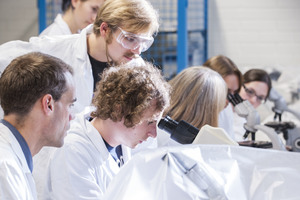Teaching Projects (Selection of funded Projects)
Funded teaching projects act as "impact accelerators" to implement the teaching strategy.
In addition to many other important teaching projects, the following exemplary teaching projects have existed and continue to exist at KIT:
- KIT-LehreForschung(2012-2016; BMBF) and KIT-LehreForschung-Plus (2017-2020; BMBF)
- MINT-Kolleg Baden-Württemberg (2016-2020; BMBF)
- Study Guides, Mentoring and Decelerated Curricula (2011-2015 and 2019-2020; MWK Baden-Württemberg)
- Aptitude and Selection for STEM degree programs in Baden-Württemberg (2019-2020; MWK Baden-Württemberg)
- Research Infrastructures for Research-Oriented Teaching - RIRO (2020-2026; Excellence Strategy - ExU)
- KIT Academy for Responsible Research, Teaching and Innovation - ARRTI (2020-2026; Excellence Strategy - ExU)
- Partnership for innovative E-examinations - PePP (2021-2024, in association; Foundation for Innovations in Higher Education Teaching)
- Collaborative project ABBA: AI for Business | Business for AI (2021-2025, in association; Federal-states funding initiative "Artificial Intelligence in Higher Education")

KIT Lehre hoch Forschung
The project KIT-LehreForschung pursues the objective of research-oriented teaching across the board. This objective is guaranteed in particular by the early involvement of all students in research projects and the sustainable improvement of teaching quality, taking into account the principle of "teaching follows research".
By qualifying students at KIT on the basis of intensive scientific and research-oriented training and additional skills acquisition, they should be able to independently identify needs for action, work on complex issues and develop sustainable solutions.
The contact details of the contact persons as well as details with further links to the KIT project LehreForschung can be found here.
MINT-Kolleg Baden-Württemberg
The MINT-Kolleg Baden-Württemberg is a joint institution of the KIT and the University of Stuttgart. As a central scientific institution, the MINT-Kolleg is aimed at prospective students and students in their first semesters with an additional range of courses in the MINT subjects (mathematics, computer science, natural sciences and technology) to make the transition from school to university easier for them and to prepare them for the requirements of a MINT degree course.
Information on contact persons, locations, departments and the establishment of the MINT-Kolleg Baden-Württemberg as well as other topics can be found here (in German only).
Study Guides, Mentoring and Decelerated Curricula
In the second tranche of the "fund for successful studying", the project "Study Guides, Mentoring and Decelerated Curricula", which was already successfully launched in the first tranche, will be funded until December 31, 2020. The aim is to provide advice and support services to help students in the introductory phase of their studies: Subject-specific mentoring programs, tailored advisory services taking into account individual study plans and orientation events on career profiles. The aim of all measures is to prevent students from dropping out unnecessarily.
You can find more information here (in German only).
Aptitude and Selection for STEM degree programs in Baden-Württemberg
This project is a joint project of the University of Stuttgart and the KIT, in which study choice orientation procedures are being developed. Applicants are to receive individual feedback via selection interviews, knowledge and study ability tests. This enables them to obtain more detailed information about the different aptitude requirements and subject requirements of individual degree courses.
Research Infrastructures for Research-Oriented Teaching - RIRO
The aim of the University of Excellence project RIRO is to increase the attractiveness of KIT for young scientists, to involve KIT's large research infrastructures more closely in teaching and to establish early contact between researchers at these infrastructures and the next generation of scientists.
KIT Academy for Responsible Research, Teaching and Innovation - ARRTI
The University of Excellence project ARRTI focuses on responsibility for society and the environment in research, teaching and innovation. The aim of establishing the academy is to enable students and researchers to take a reflective and ethical approach to scientific progress and innovation. To this end, ARRTI designs, develops and implements teaching and further education courses in the field of technology and science ethics.
Information on the contact persons and the ARRTI University of Excellence project with further links can be found here.
Partnership for innovative E-examinations - PePP
With "PePP", all of Baden-Württemberg's universities are jointly pursuing the goal of systematically tapping into the previously untapped potential of electronic examinations for students and teachers and making existing experience more widely available. In real-world laboratories, technical and didactic innovations are (further) developed and rolled out at several universities, tested under various technical, infrastructural and organizational conditions and further developed and scaled in a quality-oriented manner. The aim is to strengthen competence orientation, increase mobility and flexibility and make examinations more learner-centered.
Further information on this and the relevant contact persons can be found under this link.
Collaborative project ABBA: AI for Business | Business for AI
The aim of the cross-university joint project is to develop and provide a teaching module kit for AI that teaches business students interdisciplinary AI skills in a scientifically sound and practical way. The modular system supports teaching for Bachelor's, Master's, Executive Master's and doctoral students at universities and universities of applied sciences (HAW). The project is supported by the following universities: University of Bayreuth, Frankfurt University of Applied Sciences, Karlsruhe Institute of Technology, University of Hohenheim.
The responsible project coordinators and details of the ABBA joint project can be found here.
